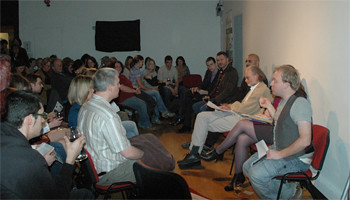The first event was a screening and discussion of A Single Man on March 14th 2010 at Chapter Arts Centre. 80-90 people attended a panel discussion involving academics from Cardiff University: Dr Paul Keedwell (Dept. of Psychological Medicine), Dr Iain Morland (Dept. of English, Communication and Philosophy), Dr Jonathan Scourfield (School of Social Sciences), and Susan Bisson (School of Journalism, Media and Cultural Studies). The panel and audience were invited to debate some of the issues raised by the film, focusing on the issues of psychological disorders, grief and bereavement, suicide, and sexuality.
The second Cardiff sciSCREEN event was a screening and discussion of The Wolfman on March 29th 2010 at Chapter Arts Centre. 70-75 people attended a panel discussion involving academics from Cardiff University and the University of Glamorgan: Dr Ian Jones (Dept. of Psychological Medicine), Dr Kier Waddington (School of History and Archaelogy), Dr Rebecca Williams (Communication, Culture and Media Studies Research Unit, University of Glamorgan), and Dr Joan Haran, (Centre for Economic and Social Aspects of Genomics [Cesagen]). The panel and audience discussed questions including, why we are so fascinated with the monstrous and the anomalous, the rise in popularity of the gothic in film, the historical treatment of madness, personal transformations, and trigger events for psychiatric disorders.
*These events were sponsored by the British Science Association as part of Science and Engineering Week 2010.










Despite finding 'A Single Man' thoroughly depressing, I felt it raised a number of important points that the panel elaborated on.
ReplyDeleteI was interested in Paul Keedwell's comment about a 'socially sanctioned' response to an event such as the death of a loved one and Johnathan Scourfield's comment that normal unhappiness is currently being regarded as depression and an abnormal experience.
As depicted in the film, there are times, such as after bereavement, when the grieving process may take someone to an absolute low and be on the brink of contemplating suicide before they can begin to come out of that 'depression' (where depression is defined as a deviation from their normal behaviour/state of mind). At what point should intervention and treatment take place when that normal and healthy grieving process tips over into something that has gone beyond that person's control?
As with the main character George, those most at risk of causing themselves serious harm because of their 'unhappiness' are probably least likely to demonstrate it to others.
Even the medical profession can, at times, be blinded by social stereotypes. I've heard a consultant say 'You don't strike me as the sort of person who would get depressed' !!!
I thought it was a good film to watch in order to begin a discussion of the points the panel raised. However, I do think it needs to go further such that there is a clear comparison between 'normal' unhappiness and clinical depression. Sue Bisson mentioned the films 'Snake Pit' and 'As Good as it Gets'. Maybe it would be worth following up 'A Single Man' with another film that can provide that comparison?
As a parting shot, I wonder whether in fact clinical depression is actually more 'socially sanctioned' than non-clinical depression (i.e. extended periods of severe unhappiness following life events). Is there not a perception that clinical depression is beyond that person's control whereas people are expected to cope with normal life events and are stigmatised if they find they cannot?